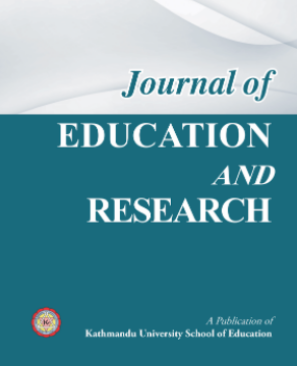
A Third Space Research Methodology Through the Metaphor of Mokshya
Original Article
Journal of Education and Research, Volume 3, Issue 2, 2013, 96-116, https://doi.org/10.3126/jer.v3i2.8400
Publication date: Aug 15, 2013
Views: 676 | Downloads: 219
How to cite this article
APA
In-text citation: (Gautam & Luitel, 2013)
Reference: Gautam, S., & Luitel, B. C. (2013). A Third Space Research Methodology Through the Metaphor of Mokshya. Journal of Education and Research, 3(2), 96-116. https://doi.org/10.3126/jer.v3i2.8400
Reference: Gautam, S., & Luitel, B. C. (2013). A Third Space Research Methodology Through the Metaphor of Mokshya. Journal of Education and Research, 3(2), 96-116. https://doi.org/10.3126/jer.v3i2.8400
Vancouver
In-text citation: (1), (2), (3), etc.
Reference: Gautam S, Luitel BC. A Third Space Research Methodology Through the Metaphor of Mokshya. Journal of Education and Research. 2013;3(2):96-116. https://doi.org/10.3126/jer.v3i2.8400
Reference: Gautam S, Luitel BC. A Third Space Research Methodology Through the Metaphor of Mokshya. Journal of Education and Research. 2013;3(2):96-116. https://doi.org/10.3126/jer.v3i2.8400
AMA
In-text citation: (1), (2), (3), etc.
Reference: Gautam S, Luitel BC. A Third Space Research Methodology Through the Metaphor of Mokshya. Journal of Education and Research. 2013;3(2), 96-116. https://doi.org/10.3126/jer.v3i2.8400
Reference: Gautam S, Luitel BC. A Third Space Research Methodology Through the Metaphor of Mokshya. Journal of Education and Research. 2013;3(2), 96-116. https://doi.org/10.3126/jer.v3i2.8400
Chicago
In-text citation: (Gautam and Luitel, 2013)
Reference: Gautam, Suresh, and Bal Chandra Luitel. "A Third Space Research Methodology Through the Metaphor of Mokshya". Journal of Education and Research 2013 3 no. 2 (2013): 96-116. https://doi.org/10.3126/jer.v3i2.8400
Reference: Gautam, Suresh, and Bal Chandra Luitel. "A Third Space Research Methodology Through the Metaphor of Mokshya". Journal of Education and Research 2013 3 no. 2 (2013): 96-116. https://doi.org/10.3126/jer.v3i2.8400
Harvard
In-text citation: (Gautam and Luitel, 2013)
Reference: Gautam, S., and Luitel, B. C. (2013). A Third Space Research Methodology Through the Metaphor of Mokshya. Journal of Education and Research, 3(2), pp. 96-116. https://doi.org/10.3126/jer.v3i2.8400
Reference: Gautam, S., and Luitel, B. C. (2013). A Third Space Research Methodology Through the Metaphor of Mokshya. Journal of Education and Research, 3(2), pp. 96-116. https://doi.org/10.3126/jer.v3i2.8400
MLA
In-text citation: (Gautam and Luitel, 2013)
Reference: Gautam, Suresh et al. "A Third Space Research Methodology Through the Metaphor of Mokshya". Journal of Education and Research, vol. 3, no. 2, 2013, pp. 96-116. https://doi.org/10.3126/jer.v3i2.8400
Reference: Gautam, Suresh et al. "A Third Space Research Methodology Through the Metaphor of Mokshya". Journal of Education and Research, vol. 3, no. 2, 2013, pp. 96-116. https://doi.org/10.3126/jer.v3i2.8400
ABSTRACT
In this paper, we argue that research paradigms arising from the Western Modern Worldview (WMW) orient research enterprise to serve metaphysics of presence (positive evidence), propositional, deductive and analytical genre and logics (Luitel, 2003), thereby privileging knowing as misappropriating local knowledge system. When the WMW fails to understand the connectedness within local worldviews, they are like colonization. Many researches are taken for granted to put all in boxes creating a dualism of the West (colonized) and non-West (decolonized). However, the dualism of the West and the Rest hardly recognizes the multiple realities of the local people. In so doing, we envision Third Space Research Methodology where we can realize the importance of both the West and the Rest drawing from their best practices. Developing such a methodology allows all voices to be heard but take precedence over the indigenous/local voice rather than the voice of the researchers. This is why, we suggest a Third Space (Mokshya- an interest of emancipation) methodology through breaking the hierarchies of the West and the local. We use a metaphor of Mokshya describing the Eastern (Hindu/Baudhhist /Jain/Sikhs) epistemic view to be aware of the colonial and decolonial parameters of research.
REFERENCES
---
LICENSE
This work is licensed under a Creative Commons Attribution-ShareAlike 4.0 International License.
